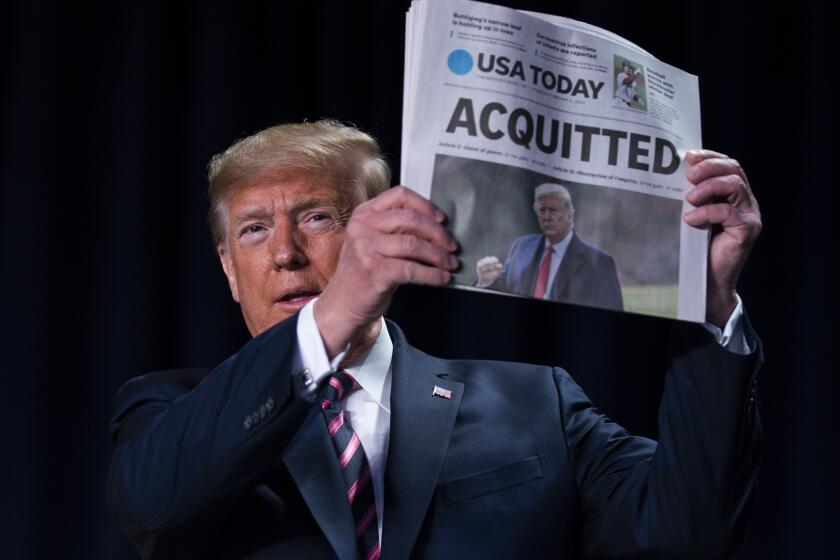Mick Mulvaney declines to sue over impeachment inquiry — he just won’t cooperate

- Share via
WASHINGTON — White House acting Chief of Staff Mick Mulvaney said Tuesday that he no longer plans to sue over the House impeachment proceedings and will instead follow President Trump’s directions and decline to cooperate.
It’s the latest reversal in position by Mulvaney, who last week asked to join the lawsuit of another Trump advisor before changing his mind Monday and saying that he intended to bring his own case. It appears to resolve once and for all a four-day dispute that exposed divisions among current and former Trump administration officials about how best to respond to Democratic demands for cooperation and testimony.
In a court filing Tuesday, one day before the impeachment inquiry enters a critical phase of public hearings, Mulvaney said he no longer planned to ask a judge for guidance on whether he must cooperate with the House. He said he would rely on Trump’s instructions “as supported by an opinion of the Office of Legal Counsel of the U.S. Department of Justice, in not appearing for the relevant deposition.”
Mulvaney had been subpoenaed to appear last week for a closed-door deposition before House impeachment investigators but did not show up.
House Democrats had seen him as a potentially important witness, in part because he has publicly confirmed the contours of a quid pro quo arrangement in which the Trump administration would release military aid to Ukraine in exchange for that country announcing an investigation into Democratic rival Joe Biden. Mulvaney’s name has also repeatedly surfaced in the testimony of other witnesses who have cooperated.
The House of Representatives intends to vote to impeach President Trump for abusing his office and obstructing Congress, a condemnation that only two other U.S. presidents have faced in the nation’s 243-year history. Despite the historic nature of the vote on charging the president with committing high crimes and misdemeanors, Trump’s fate has been sealed for days, if not weeks in the Democratic-controlled House.
After skipping his appearance last week, Mulvaney asked to join a lawsuit brought by Charles Kupperman, the president’s former deputy national security advisor. That case, filed last month, asked a judge to decide whether Kupperman had to comply with a subpoena from the House to testify or a competing directive from the White House that he not testify.
Mulvaney had argued that his circumstances were similar to that of Kupperman, but lawyers for both Kupperman and the House of Representatives opposed his request to join the suit and highlighted what they said were key differences, including the fact that Mulvaney has spoken publicly about the events at the center of the impeachment inquiry.
U.S. District Judge Richard Leon said in a conference call on Monday that he was “not inclined” to grant Mulvaney’s request.
According to the Justice Department legal opinion that Mulvaney referenced, close advisors of the president are immune from having to testify to Congress because “preparing for such examinations would force them to divert time and attention from their duties to the President at the whim of congressional committees.”
More to Read
Get the L.A. Times Politics newsletter
Deeply reported insights into legislation, politics and policy from Sacramento, Washington and beyond. In your inbox three times per week.
You may occasionally receive promotional content from the Los Angeles Times.











